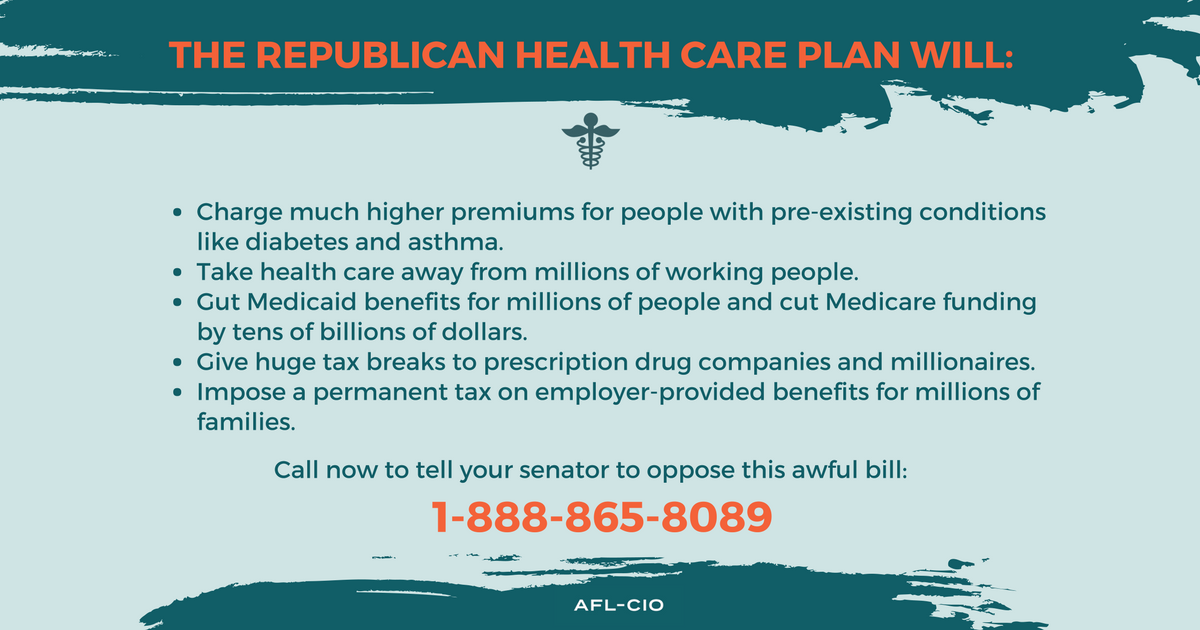

Share
As members of Congress prepare to return to D.C. after yet another recess, unions nationwide continued their campaign to get senators to derail the Republican health care bill.
The demonstrations, letters and phone calls emphasized the legislation would yank health care coverage from 22 million people in the next decade, according to the non-partisan Congressional Budget Office.
CBO also calculated that two-thirds of them – 15 million – would lose coverage next year if the measure passes and makes it to President Donald Trump’s desk.
And the money “saved” from dumping those 22 million from the health care rolls would go to a massive tax giveaway to the rich and corporations, the unions emphasize.
Other unions and activists nationwide are joining the crusade against the health care plan, focusing on GOP senators who are undecided or leaning against the legislation. Targets include Lisa Murkowski (Alaska), Susan Collins (Maine) and Dean Heller (Nevada). Republicans can afford to lose only two of their 52 senators for the health care bill to pass.
“Let’s keep the pressure on!” the Office and Professional Employees e-mailed their members. “Act now to urge your senators to oppose the Republican leadership’s healthcare bill that will rob millions of people of benefits while giving a huge tax break to the wealthy. Tell them you know the bill will: (1) Make millions of working people pay more for less care (2) Tax your workplace plans if you get decent health coverage at work (3) Give massive tax breaks to wealthy corporations and CEOs (4) Take away healthcare from millions of working people and (5) Drastically cut Medicaid, which provides vital services for a large group of Americans.”
“Tell Your Senator Not To Gut Health Care” proclaims the headline at the top of the AFL-CIO’s phone-in request. The fed (1-888-865-8089), the Steelworkers (1-877-607-0785) and the Service Employees (1-855-980-2280) distributed toll-free numbers for calling senators.
The GOP’s health care bill “would eliminate protections for people with pre-existing conditions, take away health care from tens of millions of people, raise health care costs for millions more, decimate Medicaid and give a huge tax break to the super-rich and corporate CEOs, while taxing workplace health benefits,” the fed’s sample call-in script says.
“We need a health care plan that expands coverage for everyone, not one that cuts it. Please don’t gut our health care,” it concludes.
“We have no illusions,” AFL-CIO President Richard Trumka explained about why unions continue their campaign. Senate Majority Leader Mitch McConnell “has a PhD in Washington backroom deals. He will exhaust every trick in the book, every sleight-of-hand and every shady deal to get this bill signed into law. We will not relent until it is dead and gone.”
The measure is not only “a vicious assault on Americans’ health care security,” but it’s also “a massive transfer of wealth from workers to Wall Street,” Trumka explained. It also raises taxes on workers who “negotiated high-quality health care,” he added. That’s a reference to the one tax the Senate bill keeps: On so-called “Cadillac” health plan benefits, many of them union-negotiated.
The Alaska AFL-CIO headed its “Action Alert” on health care with “Tell Sen. Murkowski To Vote No On Secret Health Care Bill And Protect Our Care,” referring – though not by name — to the fact that McConnell and his staff crafted the GOP health care bill in secret, after a 13-all-male-senator GOP working group failed to do so.
“Like many Americans, you may have parents or other loved ones in nursing homes because they require around-the-clock care,” it said. “Nursing-home care is expensive, typically $80,000 per year for a semiprivate room — far more than the income of a typical senior.
“Medicare generally pays only for short-term nursing-home stays. Yet only about 1 in 10 people 65 and older have private long-term care insurance to cover nursing-home costs. For a great many people, that insurance is too expensive,” the Alaska federation added.
“Medicaid is the one thing people can count on when their money has run out. Losing that coverage, as could happen to some people if congressional Republicans and President Donald Trump succeed in gutting Medicaid funding to pay for tax cuts for corporate CEOs and the wealthiest 1 percent, would force working people to make impossible choices about how to care for their parents and other family members when they can no longer care for themselves.”
The Service Employees also concentrated on campaigning for Medicaid. But “It’s time to represent the interests of working Americans, not insurance and drug company CEOs,” Service Employees President Mary Kay Henry said. Her union reported members making 240,000 calls against the Senate GOP health care bill even before the congressional recess.

